The Port of Tanjung Pelepas: Malaysia’s Technologically Advanced Container Terminal
MIDA
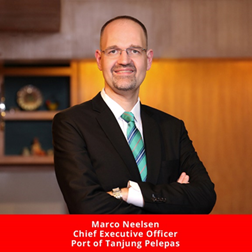
The Port of Tanjung Pelepas (PTP) is Malaysia’s most prominent port with a technologically advanced container terminal. A joint venture between MMC Corporation Berhad and APM Terminals, the port was developed as a green-field investment on an area which was previously a fishing village. Strategically located at Tanjung Pelepas of Gelang Patah, PTP is well positioned at the southwest shoulder of Johor from the confluence of the busiest international shipping lanes that go through the Malacca Straits.
The area surrounding PTP is of advantage with natural factors such as it being located in a sheltered bay with no tide restriction and with naturally deep drafts. With a 12.6km access channel and a turning basin of 600m, it takes shipping vessels only 45 minutes to divert into the port. Being a single terminal port operator, PTP has achieved remarkable success by becoming one of the world’s busiest container ports in less than just 20 years since its opening. Currently, PTP holds the 18th position among the top 100 ports in the world.
In 2019, a significant milestone was achieved when PTP became the first and only port in Southeast Asia to welcome Mediterranean Shipping Company’s (“MSC”) latest and largest container vessel in the world as part of its maiden voyage in the South East Asia region.
The historic calling of MSC Gulsun at PTP also led to another world breaking record. The MSC vessel left PTP on 28 July 2019 with a record load of 19,574 TEUs, surpassing the previous record load of 19,284 TEUs set by the Monaco Maersk in June 2019. These achievements are testaments that the logistics sector is of paramount importance in facilitating global trade and will be the forefront of Malaysia’s economy moving forward.
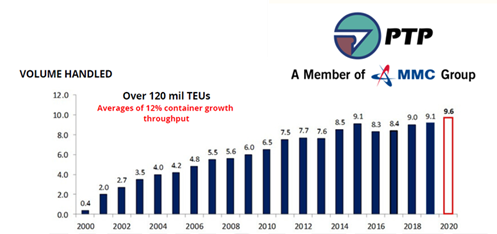
Since its opening in 2000, PTP has proven its global competitiveness with an average of 12 per cent year on year growth of its regional market share.
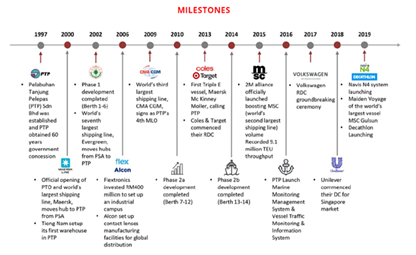
PTP continues to attract significant investments from global companies. Going forward, PTP is well-positioned to handle over 10 million TEU of cargo capacity and will continue to deliver value to its stakeholders, focusing on sustainable performance and continuous improvement through consistent productivity and service levels. Connectivity
PTP is well connected to the hinterland. Cargo movement from major industrial estates is convenient given the roads linking the port to the second Malaysia-Singapore expressway and the north-south highway. This shows that the port is connected up to the north of Peninsular Malaysia and the Thai border. Adding to the port’s land, sea and air infrastructure support, the rail line that runs through PTP is also directly linked to the national rail grid which connects Singapore and the southern area of Thailand.
The extensive shipping connectivity available at PTP assures that all goods can be delivered to almost all ports globally. Today, PTP services over 30 shipping lines and box operators. It is also connected to over 300 port of calls globally with over 90 weekly services.
Core Business - Container Services
Terminal operations in PTP are backed by state-of-the-art facilities, equipment and information technology systems linked to all port users. To date, PTP is operating with 14 berths totalling 5.04 km in linear wharf design. Directly behind the berths is the port’s container yard, which is one of the most extensive container storage facilities in the region with the capacity to handle up to 12.5 million TEU annually.
PTP has a range of quay cranes, rubber-tyred gantry cranes, prime movers, trailers and high stackers, which provide ample support for fast terminal operations. This includes 58 Super Post Panamax quayside cranes, as well 163 rubber-tyred gantry cranes and 430 prime movers to service the container yard.
Today, PTP has moved towards Industry 4.0 through various digitalisation and digitisation initiatives. This has contributed to its efficiency while contributing to the future growth of the port. A port that operates and offers smart solutions will indeed assist in optimising operations, promoting efficiency and reducing logistics costs. These are in line with PTP’s aspiration to become an advanced, preferred port in the region.
Core Business - Free Zone Services
PTP Free Zone, or Pelepas Free Zone, comprises of 5 phases, spanning across approximately 1,600 acres of land area. The current operational phases of 1 and 2 represent 40 per cent of the total Free Zone area, with more than 90 per cent already leased.
Today, after 20 years of operations, Pelepas Free Zone has become a vital global and regional hub. It houses more than 40 companies, which employ 11,000 people and contributed RM2.8 billion investments to the country.
These companies carry out consolidation and distribution activities for automotive parts, fast-moving consumer goods (FMCGs), consumer electronics, commodities, furniture, apparels, sports items, toys, home appliances, e-commerce, cold storage and medical devices, as well as manufacturing of food, electronics and contact lenses.
These companies enjoy a hassle-free business environment with minimal red tape supported by 24/7 port operations and security. Import-export approvals and clearances are authorised by PTP’s Free Zone Authority through its in-house IT system without additional Customs’ documentation and paperwork requirements. The trucking services to move import-export containers to and from free zone warehouses are also competitively priced without brokerage fees.
Dedicated Customs Green Lane access along with the truck levy exemptions are privileges accorded to companies in the Pelepas Free Zone to conduct fast, efficient and cost-effective cross border cargo movements to Singapore via the Second Link.
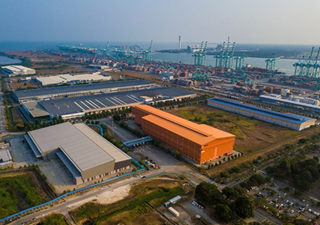
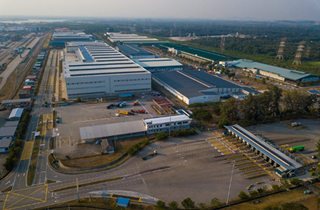
Land Leasing Opportunities in Pelepas Free Zone
Phase 2C, an extension of Phase 2 of the Pelepas Free Zone, accounts for 100 acres of land that is currently being developed with necessary infrastructure for leasing in 2023. Prospective investors can lease land parcels for 30 years at competitive rates to build warehouses for short and long term rentals, or factories for light and environmentally-friendly manufacturing activities.
Core Business - Marine Services
PTP provides a range of excellent marine facilities for all vessel traffic going through its waterfront limit. This includes tug boat services, pilotage services, and ship to ship services. To date, PTP has handled 122,000 vessel calls and operates its marine services with 9 units of tug boats, 3 units of pilot boats and 45 internationally qualified pilots.
Pilotage is compulsory within the Port limits, with PTP providing its service 24 hours a day, 7 days a week, under the management and control of its Vessel Traffic Management Information System (VTMIS). This service provides an operational improvement in terms of efficiency of vessel traffic movement and improves the safety of navigation within Port approaches or through hazardous areas.
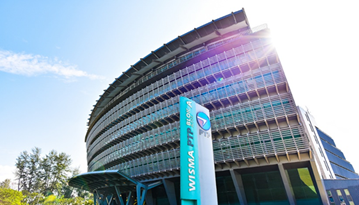
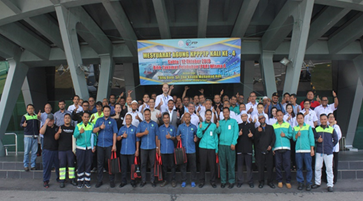
Social and Human Capital Development
As one of the fastest-growing ports in the world, PTP has created a catalyst for growth beyond the shipping community, not only for the state of Johor but nationwide. As the preferred employer in the state of Johor, PTP boast of staff strength over 4,300 employees. The majority of its employees are from Johor (72%). Others are from all over Malaysia, including Sabah and Sarawak.
Undoubtedly, PTP’s success as one of the top port in the world is driven by its team of talented employees. PTP’s employees have the opportunity to build their careers from entry-level to senior management positions. Much of it is due to the focus on the continuous development programmes for all employees.
PTP has comprehensive industry collaborations with the local universities to ensure the nation’s talent base for the port industry is developed following its exacting demands. PTP also proactively collaborates with various industry stakeholders to ensure employees can prolong their careers and continue to be productive members of society. For example, there is an on-going collaboration with the Social Security Organization (SOCSO) to establish a rehabilitative centre on-site to meet the needs of all its employees.
It is estimated that with the future investment opportunities garnered by Iskandar Region and PTP’s plan for expansion, the port will create thousands of new businesses and spin-off industries in its surrounding community.
This will contribute more than 11,000 job opportunities for the highly skilled and semi-skilled workforce as engineers, contractors, builders, operators as well as accommodation, security and catering services. Giving Back
PTP’s corporate social responsibility (CSR) strategy is aligned with its business priorities. It is actively involved in socially responsible engagement activities with shareholders, community, government agencies and employees. PTP’s CSR activities encompass four key areas which are education, sports, environment and the local community.
For example, in response to the current spreading of COVID-19 outbreak, PTP has taken a proactive action to reach out to the nation’s front-liners by organising various contributions of essential items to ease the burden of the target group. This is also to extend gratitude to them for their service to the nation. Apart from that, PTP has distributed essential packages to under-privileged communities such as old folk’s homes, orphanages and more than 300 needy families around the local area.